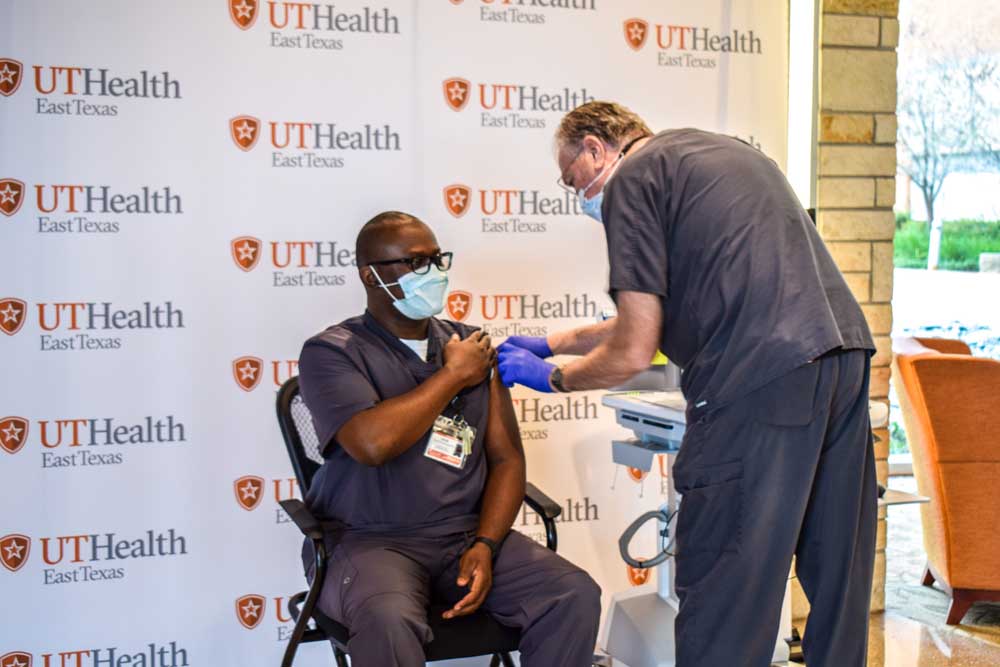‘Virtually none’ of locally hospitalized COVID patients are vaccinated
Published 9:30 am Friday, January 28, 2022

- Chukwuemeka Ogobuiro, registered nurse for UT Health East Texas, receives a booster dose of his COVID vaccine Wednesday at the UT Health North Campus in Tyler where the first dose of the vaccine was administered in East Texas.
As Smith County surpassed the record pandemic high of new COVID-19 cases reported in a single month this week, Tyler hospitals are nearing their pandemic high records, too.
According to data from the Northeast Texas Public Health District, in September of 2021, the county saw a total of 8,351 new COVID-19 cases. As of Monday, there have been 8,857 new cases reported within the first 24 days of January, surpassing the pandemic high by over 500 new cases.
Trending
NET Health reported a peak in COVID hospitalizations of 389 in September of 2021. As of Monday, there are 265 East Texas patients in Tyler hospitals.
The number of COVID-19 patients in the state’s 19-county Trauma Region G also continues to increase, those numbers which include hospitals in the Tyler/ Longview area. On Tuesday, there were 502 patients hospitalized in the region, an increase of 48 patients since Monday’s report. The hospitalization number includes 106 patients in intensive-care units and 79 patients on ventilators. In the first half of September, hospitalizations reached 822, the highest number of single-day COVID-19 hospitalizations in the region since the pandemic began.
UT Health East Texas Division Chief Medical Officer Dr. Tom Cummins said unvaccinated populations are being admitted into the hospital with full-fledged pneumonia, some requiring ventilator support.
“Virtually none of them are vaccinated,” said Cummins.
For those unvaccinated and unboosted who are catching COVID, though not as severe as delta, the omicron variant is just as severe as any other COVID waves before.
The hospital is also struggling in staffing, with people leaving the workforce and some of their own getting COVID at other places.
Trending
Cummins said there beds the hospital isn’t able to staff, and with the number of people coming in with COVID, it takes away from staff’s ability to take care of other medical conditions because there are too many people in the emergency room getting evaluated for COVID.
“It’s made things really challenging for our ambulance service to get people to hospitals and ER’s and challenging for our staff to take care of people who are really sick,” Cummins said.
In efforts to address staffing, UT Health has brought in traveling or agency nurses, and the state has provided some nurses to help through the middle of February. Cummins said that while this hasn’t eliminated the problem, it has cut back on the number of beds the hospital hasn’t been able to use.
Another factor straining local hospitals include the allocation of monoclonal antibodies in the immediate Tyler- Longview area as the treatments have historically had an impact in hospitalization rates and local emergency room visits.
“If the virus does here what it has done in other countries, which is, have a really high, rapid rate and escalation in number of people infected, but the mass majority of them having a very mild infection and a very rapid decrease in the number of cases again, if that happens, then no, the lack of sotrovimab is not a big issue,” Cummins said, Jan. 4. He added that if it persists, it may become a problem.
Now three weeks later and local hospitalization numbers just 124 short from September’s 389 peak in COVID patients, Cummins said having the effective monoclonal antibody treatments would “certainly be helpful.” As of Wednesday morning, UT Health’s COVID count is just under 200 across the division.
Hospitalization rates trail positivity, Cummins explained. He said there could be a decrease in hospitalized patients within the next two weeks as there is a small downward trend in positive cases.
At Christus Trinity Mother Frances in Tyler and Christus Good Shepherd in Longview, hospitals are experiencing an increase in COVID hospitalizations, though hospital officials said there has not been a surge in severe disease.
While it is too soon to draw conclusions on the long-term risks and effects of Omicron, a communications director said the variant appears to be highly transmissible but less likely to cause lower respiratory tract symptoms and severe disease. In Longview, Christus Good Shepherd is providing drive-through testing at the NorthPark facility at 323 E. Hawkins Pkwy.
“We strongly encourage our communities to protect themselves, their loved ones and their neighbors. Though there is still much to be learned about Omicron and other variants, we do know that the most effective tools against this and all COVID-19 remain the same; Get vaccinated, wear a mask, wash your hands often, practice social distancing and stay home if you are sick,” wrote the director in a statement.
Patients going into clinics, emergency rooms or who are testing at home with rapid tests, Cummins said, are typically having body aches and cold and flu-like symptoms. A percentage of them, a rising number over recent weeks, are becoming seriously ill, experiencing severe coughs, shortness of breath, low oxygen levels and require hospitalization and oxygen treatments.
Those patients that don’t need to go to emergency rooms can take Tylenol for aches, pains and fever, Cummins said and over-the-counter cough medicines for the cough and fluids. Vitamins such as Zinc, Vitamin C, really don’t make an impact, but don’t hurt, Cummins said, clarifying he does not necessarily recommend them.
“If you’re going to be out in public, put a mask on. It’s the single best thing we can do to slow this down right now. Vaccinations will help for the long run,” he said.







